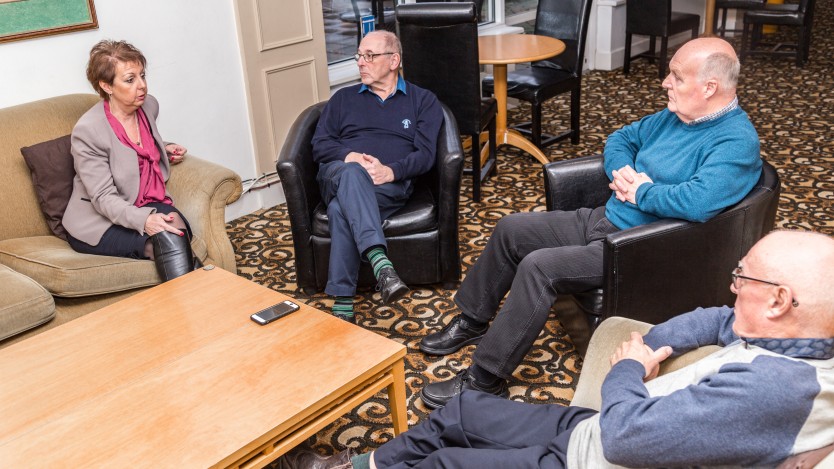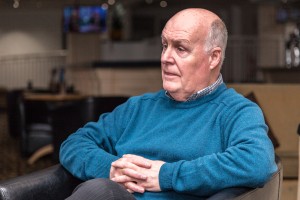Regional managers are at the heart of the GCMA structure, providing the main support and social networks for members. We asked a quartet to talk about their jobs and the association…
With the GCMA split into regions, the 16 regional managers that take responsibility for an area obviously have a huge responsibility to spread the word of the association to members – whether that is through meetings, seminars or just offering vital support when needed. But how did they get involved? How do they feel about the GCMA and why can attending meetings be so beneficial?
Our panel get stuck into the debate… How did you become regional managers and what was motivation behind taking the role?
 Rob Wormstone: I don’t think anyone else would do it! But, seriously, our existing secretary gave plenty of notice to the region that he was retiring and they went through a process. I think three people applied and I ended up with the role. It was a proper CV interview with the past captains.
Rob Wormstone: I don’t think anyone else would do it! But, seriously, our existing secretary gave plenty of notice to the region that he was retiring and they went through a process. I think three people applied and I ended up with the role. It was a proper CV interview with the past captains.
Neil Annandale: To put it in context, I joined the association in 1999 and, having been a member and seeing what the region does, I’d seen two previous regional managers who had both been in post for a considerable number of years. Howard Williams, the current national captain, was going to be stepping down when he took up that role and I’d been working on the planning group – behind the scenes and getting involved with Howard and working with him on some specific projects like the centenary at Formby.
I had an insight as to what the job entailed so, when the vacancy became available, I put my nomination forward. I was unopposed, I was elected and I have been doing it for the last 12 months now.
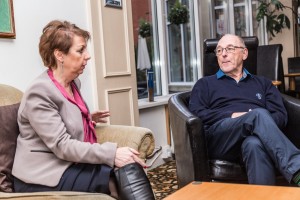 Martin Bennet: In Chiltern region, Colin Hextall was there for a long time and gave notice that he was going to go. I had been on the committee and I put myself forward. I thought I’d enjoy doing it. Colin then decided to stay on but I was there in waiting all the time. He did another 18 months and I’d been on the periphery of it. Our region is not as regimented as others and it was just a question of being nominated at the relevant AGM and I just took over. But I’d had an 18-month lead in period, which was quite good because I followed what Colin was doing.
Martin Bennet: In Chiltern region, Colin Hextall was there for a long time and gave notice that he was going to go. I had been on the committee and I put myself forward. I thought I’d enjoy doing it. Colin then decided to stay on but I was there in waiting all the time. He did another 18 months and I’d been on the periphery of it. Our region is not as regimented as others and it was just a question of being nominated at the relevant AGM and I just took over. But I’d had an 18-month lead in period, which was quite good because I followed what Colin was doing.
Karen Drake: We had a longstanding regional manager, Brian Rimes, and he was beginning to feel he wasn’t able to commit quite as much time as the job entailed. I’d previously been involved in organising a few business seminars for the region – on the region’s behalf. I was one of the committee members and I saw it (regional manager) as an opportunity to be able to progress that and get involved. I loved putting something back into the GCMA because I’ve got a lot out of it and I’m the sort of person that likes to be involved and likes to do something worthwhile. So here I am.
Unfortunately for me, it coincided with me moving job, which was quite a task and I wasn’t able to commit as much time at the beginning as perhaps a lot of regional managers do. I’ve managed. I survived and I think I put on the same number of meetings as other regions do. To me, it’s just seems quite useful that I can be at the club and know exactly what topics are in order to put those in front of people. It’s very useful.
RW: For me, it was all about the networking. As soon as I got a job, I joined the association. I didn’t know too much about it at the time but I did know that the strength of a network is very important.
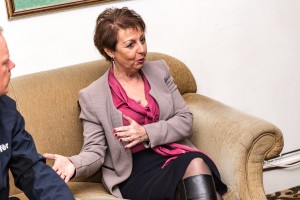 KD: Doing my job as well, there is the means to be able to contact people and say ‘I’m looking at doing X. Any ideas who you might have used previously?’ You just learn so much more and gain friendships. You make so many friends through it.
KD: Doing my job as well, there is the means to be able to contact people and say ‘I’m looking at doing X. Any ideas who you might have used previously?’ You just learn so much more and gain friendships. You make so many friends through it.
NA: I take my hat off to you for doing it while working. The three of us are fortunate. We are retired, you are the only working manager and regional secretary as well. I think that is a big commitment for somebody like yourself because I know how time consuming it can be for me in the role. I don’t think, on occasions, that behind the scenes people realise just how much time and effort you do put in – especially when you want your monthly meetings to be to the point, to be professionally run and to go smoothly. You are representing not just yourself but also the association. I take my hat off to you Karen for doing both jobs.
KD: I suppose I see a lot of people in my working life that come to me trying to sell their wares and, often, I’ll talk to them after we’ve met and invite them to come to my regional meetings. So, in a way, it aids that. I haven’t got to go out cold calling like you guys have to do. You must have to pick up the phone to various people to make contact with them. I get those contacts because they come to me, rather than me looking for them. So, in a way, it’s easier for me.
RW: The other thing that’s nice about this group (of regional managers) is that I know most of them now. There are one or two newcomers over the last 12 months but I can pick up the phone to most of them and talk about speakers, topics, ideas, meeting venues and so I think, because we have got our own community that works on our level as much as it does on the bigger association level. You’re talking about 100 or so members in your region. The 16 of us seem to work together quite well and are quite happy to share knowledge among ourselves and that’s nice too.
MB: I think one of our challenges is the personal development of our colleagues rather than the commercial presentations in meetings. One thing the association might have to look at going forward is a bit more pastoral care. This last year, four of my managers have left claiming stress and disillusionment with the golfing hierarchy – and committees – and I think the association probably needs to cuddle our members a bit more going forward.
KD: I have seen that a lot in recent years, where people have been at a club for a good length of time and then they have taken on another role somewhere else, they have been there three or four years and then they have a new chairman or captain in post and it’s almost as though they just clash. That manager suffers as a result of that. RW: We also need to be educating our guys and girls on how to deal with stress and recognising it. What are members who don’t attend regional meetings missing out on?
RW: It’s the networking, really. It’s being able to interact with your peer group – and we all want to belong to a tribe. We want to feel the comfort of shared pain, if you like, or shared success. They are not really doing themselves any favours by working in isolation. That’s my feeling and that’s what I try and get across.
”The development I have seen in recent years has moved away from the pure supplier sell to the education element of the (regional meeting)” – Neil Annandale
KD: Then that stress becomes relieved because you are having a therapy session with those who you are meeting with. When you turn up and you have got all these pressures and all these things going on at your own club and you talk to someone else who has got the same, or even worse, you often go back feeling a little bit more relieved that at least your job isn’t quite as difficult as theirs.
NA: Networking is a big part of it and that’s probably the soft and secondary benefit but we obviously put together a programme for those meetings. There is the continued professional development side of things which, if we are doing our jobs right, and we’re talking to the members and finding out the factors which are important and affecting them and making their jobs difficult, then it is up to us to hopefully tailor a package of training and presentations.
The development I have seen in recent years has moved away from the pure supplier sell to the education element of it. Just as a member, and not as a regional manager taking part in the meetings, I used to go and think ‘well, I’m going to learn who I am going to be able to buy my toilet rolls cheaper off next week’.
Now, I go there and it’s more about skills and key skills development issues that are being put in front of me. I think things like sourcing supplies – with the tools at your disposal such as the internet – has become easier. You don’t necessarily need to have that shoved down your throat.
A quick phone call to Fred or Freda down the road and it’s ‘who are you using for your admin software?’ But the skills, in terms of how to overcome objections, how to deal with difficult members, how to recognise stress, which are all the sorts of things we are putting in front of our members now, have probably moved to the front of the queue.
KD: I have noticed, comparing my role to that of my predecessor, that it was very much about a gathering and networking. Now it’s all focused on the business side and the education side and we are far more disciplined. There’s a consistency among the regions now – far greater – and that’s only in the last 10 years I suppose.
It has really changed and we are providing very good business opportunities and education opportunities to those that are in the region. The friendship and the networking comes as well – as a result of that – but, primarily, we are far more professional about delivering that whole package.
MB: I’m not afraid to say also that one of the reasons why I agreed to do this type of job is I get a buzz out of watching people get something out of it. The feedback that you get on the day – ‘thanks that was a good meeting, I really enjoyed that because I made a contact with x, y and z’ – that’s the buzz that I get. We all of us need that feedback and, when it happens, that’s why we do it. We want to give of ourselves for others.
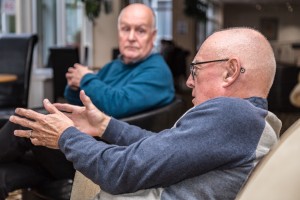 RW: It is a good feeling to get that but always in the back of my mind there is this nagging little thing churning away that says ‘why didn’t you manage to get so and so, and so and so (to come)?’ One thing I’ve got (at an upcoming meeting) is four people who have never been to an association meeting while I have been a member – and that goes back 10 or 12 years or more.
RW: It is a good feeling to get that but always in the back of my mind there is this nagging little thing churning away that says ‘why didn’t you manage to get so and so, and so and so (to come)?’ One thing I’ve got (at an upcoming meeting) is four people who have never been to an association meeting while I have been a member – and that goes back 10 or 12 years or more.
I’ve got four of them and I intend to go and have a chat with each one of them and say ‘what was different about this agenda than what we’ve had in the past?’ I have been trying to make it all educational. This is educational based, but what’s the difference? Is it the location? Is it the timing? Is it the fact there is no golf, so you haven’t got to justify to your committee, chairman or line manager that you are out of the club and are possibly playing golf. There is none of that. Maybe that’s still part of the justification of coming to this meeting and not the ones where there is the golf element.
MB: People say to me ‘well I can’t do that because of this or the golf’, I will say ‘well, you’ll still go and play golf at other courses otherwise how do you know whether your course is better or worse?’ It is up to us to get out and see what other places do. I am sure all of us feel that we never actually stop working when we are playing golf. Our golf has gone to pot because we are working every minute.
RW: You put yourself out last and you end up with one of the poorest scores because everything is still going through your head.
MB: But I would hope that we put that across to people who don’t attend that it’s ‘come along, network, have fun, have a couple of hours out of the office and learn something along the way’. I don’t know why people don’t do it. In my business life, I would always go to the exhibitions and the training courses.
KD: That’s probably your personality and your characteristic in that you are always willing to learn. There is an element who are not willing. Whether there’s an element of arrogance – that they don’t feel they need to – or whether they don’t feel it’s professional enough, I don’t know. When people ring me up and say ‘I can’t make it because of x, y and z’, I think ‘that’s a very poor excuse’.
RW: I had one lady who said ‘I don’t need to come. I run this golf club. I don’t need you’. I am thinking ‘that’s quite an arrogant way of looking at it’.
KD: How does she know that until she goes to other golf clubs and talks to others and sees for herself?
RW: She was just isolated. She said ‘I have to do everything’. So she has not obviously got the skills to delegate and it all falls down to her. She had an office that was completely cluttered up with boxes everywhere. You think to yourself ‘how can you work in that environment to start with?’ It’s important for those who don’t attend meetings to know it’s not just about the meetings. The support extends outside too…
NA: When you start talking to people about it, you realise attendance at meetings shouldn’t be viewed as the be all and end all of the benefits of GCMA membership. You’re talking about that informal community and networking that goes on outside of meetings – the Facebook groups that we’ve established in the region.
They know, because they are all members of the same association, that they are likeminded individuals. The fact that they can pick up the phone and talk to head office – the helpline – that they can go onto the head office library and they’ve got the magazine, which gives them the information.
They can refer to the website after the event, see copies of the minutes and see copies of the presentations. The ways people educate themselves are different. Some need that more formal environment of the meeting and other people are more insular and they prefer to operate in that way. It’s as long as you don’t think your only valued members are the ones that attend the meetings.
You keep in contact as a regional manager, head office does through the weekly update emails, and then they still feel involved and feel important. When something happens that they don’t feel comfortable with, they know you are only a phone call away.
